
Transcription
FORCED TO DIE ALONE part 2
A LONELY BED TO SUBSTITUTE GOD AND FAMILY
In my first article titled "Forced to Die Alone: A Lonely Bed to Substitute God and Family" I tried to approach the increasing plight of terminally ill patients dying along in the Skilled Nursing Facility (SNF) here at MCI Shirley Medium from an objective viewpoint. However, it is next to impossible to write on a subject that has such a profound impact on my life and expect it to be objective. When I write about men whom I know who want to commit suicide rather than be placed on a medical ward, my emotions run wild. Equally important, if not more, is when I see my future and what it holds for me. Factors such as these make things a whole lot more complicated and a lot less objective.
I remember when I went before the parole board for the first time and they asked me, "what are you afraid of if we give you parole?" I closed my eyes, paused, and said, "being alone." "Thank you for your honesty" was the reply but I couldn't appreciate what they were saying because I was still feeling the despair that came from the thought of being alone. I try not to think about what it would be like if I were sick and forced to live in a medical ward called the "SNF" because the thought is a lot more real than I would like it to be.
Just recently I read an article titled, "More Prisons Need Hospice Care" by Larry Bratt, special to the Washington Post. In it, he describe with eerie similarity, the conditions at Jessup Correctional Institution in Maryland. What's worse is that this article confirms my worst fear; this is not a local problem! I recently authored a position paper for MaCURE (Massachusetts chapter of Citizens for the Rehabilitation of Errants) and was astounded by the exponential increase of geriatric prisoners both locally and nationally. According to the ACLU, caring for ageing prisoners in the United States costs the taxpayers an average of 16 billion dollars annually - that's $68,000 a year for each inmate over 50 years old. That is twice the amount to house an inmate who is younger! In my position paper I clearly tried to convey the benefits of instituting a meaningful commutation/medical release program, as one way, if not the only way, to solve the ever increasing fiscal budget the taxpayers dish out to the Department of Corrections. It will also allow prisoners and their families a meaningful end of life solution with no negative effect on public safety.
Larry Bratt refers to Louisiana State Penitentiary in Angola as another alternative. In 1990 Warden Burl Cain (a nationally known penologist) instituted a hospice unit in the prison and after just two years was honoured for the program with the American Hospital Association's Circle of Life Award. Here at MCI Shirley in Massachusetts the administration has begun what they call a Companionship Program in which selected/approved inmates will be paid to look after ill prisoners housed in the "SNF." The problem, however, is that it does not address the need for friends being able to visit with ill prisoners whom they care about.
Effective end of life management allows friends and family to meet with the terminally ill to talk, engage, bring closure, to pray, and say I love you one last time. I am serving a 2nd degree life sentence and have been incarcerated for over 20 years. What I have learned is that in extreme situations, extreme simplicity emerges. In spite of my surroundings I have been fortunate to forge meaningful relationships with prisoners who share common beliefs, and a desire to learn based on trust, love, and fellowship. One such person, William "Billy" Barnoski, has through the years become more than just a friend. He has become a father figure and mentor adding much needed guidance to a life which had none. He has encouraged me to change my self-awareness. For the past eleven years we have spent a good portion of everyday together but recently he was diagnosed with brain cancer and placed in "SNF." Now I am lucky if I catch a glimpse of him as he enters a transport car on his way to chemotherapy.
Over the years his family has embraced me as one of their own so I am able to call and receive updates on his health and progress through his wife and daughters otherwise nobody, including myself, would know anything about him or how he is faring. Once a prison is housed in the "SNF" the only family and friends that can see them are those that come from the outside. There are numerous inmates who reside in the "SNF" who are not as fortunate as Billy. They don't receive visits from the outside; the only close relationships they have are from within prison walls. If you are one of these, you die alone in the confines of "SNF."
Supreme Court Justice Anthony M. Kennedy said in a 2012 address, "it's true that death sentences are unique in their severity and irrevocability, yet life without parole sentences share common characteristic with death sentences that are shared by no other sentences... [it] deprives the convict of the most basic liberties without giving hope."
It is the combination of many in "SNF" who are doing life sentences with their isolation from the prison population that further erodes the will to live. In addition, prisoners housed in the general population see what's in store for them and share in the common theme of hopelessness; their bond, if any, is despair.
What can be done to change this? Contact your local representative/senator and tell them to support Senate Bill SB-1139. If passed, Compassionate Release of Terminally Ill Prisoners will ease the burden of the taxpayer while affording a merciful end of life alternative than what exists now. To learn more(1) about compassionate release and its effect on public safety and fiscal responsibility go to www.realcostofprisons.org and www.solitarywatch.com and http://betweenthebars.org/blogs/101 and www.freejoelab.com.
1. About the author. Shawn Fisher has authored several articles most recently for Massachusetts C.U.R.E. on commutations. He can be reached at PO Box 1218, Shirley, MA 01464. For more on conditions of confinement and prison reform issues go to http://betweenthebars.org/blogs/101 and www.freejoelab.com. Or contact MaCURE c/o Karen Schulman, 171 Congress St., Milford, MA 01757.
Other posts by this author
|
2017 jun 24

|
2017 jun 24
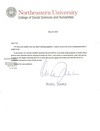
|
2017 jun 24

|
2017 jun 24
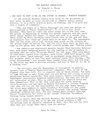
|
2017 jun 18
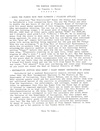
|
2017 jun 15
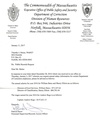
|
More... |
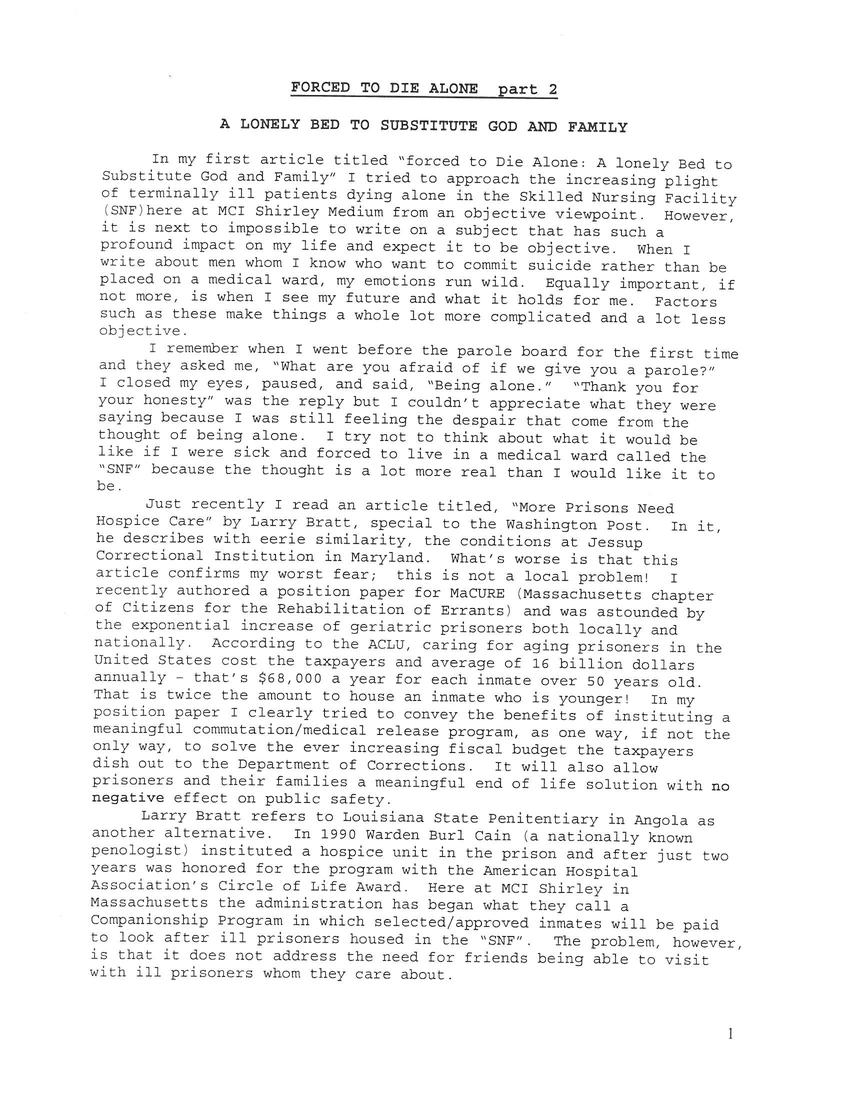
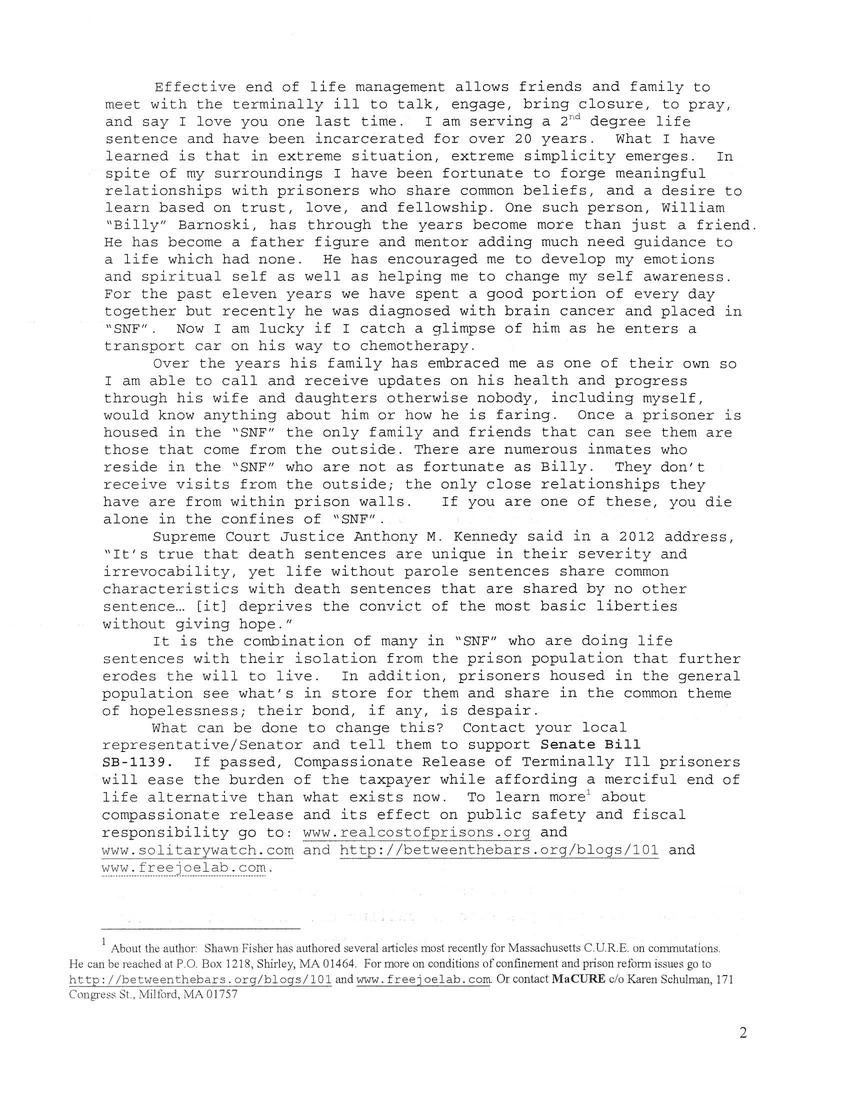

Replies